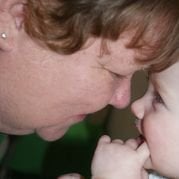Search the Community
Showing results for '"Weight gain"'.
Found 15,901 results
-
One year ago I was rolled down the isle in an 2XL gown, big ole booties and a smile because I knew my life would change. I went in prepared to face the challenges and joy that this decision would cause me. The first month I survived the liquid diet, post-surgery pain and discomfort and lost bonus 10 lbs that I have yet to see again. The second month I noticed my clothes getting looser and another 5 lbs gone, I can eat but the problem was I wanted to eat everything so I was welcomed to Bandster-Hell. The third month I had gotten my first fill 2ccs humm felt tight for like a day then back to eating it up… good thing no weight gain and another 2lbs gone. Month four, I noticed my size 22’s are falling off of me literally and another 2lbs gone, this is going slow I thought time for a fill and off I went another 2cc’s now 4ccs in a 10cc band. Month five another 2lbs goneI am still hungry and my 20’s are fitting loser, food still goes down pretty easily, and I have yet to experience a stuck episode I was so happy. Another .5 ccs in the band. 4.5 ccs Month Six no weight loss nothing, not a pound, I am starting to feel full faster but I can still eat two burritos and taco bell. And my workouts are sporadic time to make an appointment with the doctor .5cc’s he said I say more but I will see. Month Seven, Had .5cc’s in my band I don’t think that will do much of anything for me, but I took the doctor said wait another week and if it doesn’t work out then I can come back however, I got really busy with life and alas no weight loss but bread is off the menu forever, I experienced my first episode of slime and stuck with a piece of pork chop, and then a piece of bread. 5.5 ccs in the band I am halfway full that has got to count for something. Month eight, I am feeling discouraged I ended up not losing any weight this month, I lost 5lbs with my fill and I gained it back. I don’t know why because I can’t eat as much, and I am moving more it is spring and hot around here. I ended up having hernia surgery and couldn’t get a fill until I recovered from my surgery and I finally got the fill I wanted 1 cc’s now I am more than half way there 6.5cc’s and I am really feeling that day to day stuff that I have read about on the boards, feeling tight in the morning, I can eat a yogurt and be stuffed, and be satisfied for hours oh and my 20’s are now gone, I am now in a very loose fitting 18…I can’t wait. Month nine, it has been a few weeks since my fill I lost another 5lbs which is nice and my 18’s are gone I am in a 16 which I haven’t been in since 2003, I still have a ways to go I somehow thought I would have gotten further in my pounds lost but it is not that bad. I would have hit this point without my band. My eating is good I think I have hit my sweet spot but some days I am a little tighter I have learned to eat slow, I can’t eat fries, bread, and dry turkey oh and nothing on the McDonalds dollar menu goes down… so no bad foods for me. Month ten, weight loss has slowed down I think my body is doing the starvation hold, so my goal to combat it is to increase my exercise. Month eleven, I have increased my exercise and I am starting to feel better, I went shopping and no matter what store I went in I fit the 16’s and some were even loose and I lost another 5lbs this month. Now at month twelve I don’t regret my decision to have the band, my life has changed in my activity level my confidence I am still struggling or say dealing with the consequences of not planning my meals, eating too fast or trying those forbidden foods, but I know I am this for the long haul which is awesome to me. I have increased my activity level and plan to keep that up, I will be at my goal weight next year this time and with my band to use as my food tool, and my motivation as my next I will be there… Happy Bandiversary!!! :redface:
-


Fabulous February Post-Op's
Cecilia replied to ArmyWife&Mom's topic in POST-Operation Weight Loss Surgery Q&A
True confession time: I actually *gained* two pounds back. Or that's what the scale says. I'm probably just retaining water because I've been cheating with salty snacks and not getting enough to drink to flush it through. So anyway, I had a heart-to-heart with myself today. "Self," I asked myself, "what gives with all the crazy wrong eating? The bag of jaw breakers you bought the other day, the popcorn and chips at work, the TWO cookies?! What--are you *trying* not to lose weight?!" ... and the answer came to me crystal clear. "Of course." I think something snapped when everybody, and I mean EVERYBODY from the hair dresser to the check-out lady at the grocery store, to the housekeeping staff at work comments on my weight loss. No matter how nice or supportive it is, it's flipping overwhelming. Then there's the trip to the Cities last weekend (that's Minneapolis/St Paul for you non-midwesterners) and hitting four consignment/Savers type stores and loading up on clothes, some of which already feel loose (yes, even with the 2-lb weight gain). And finally, I'm sure taking all my "fat clothes" to a resale shop here was the last straw. I'm "shrinking" as one coworker put it, and I just want it to stop for a while. I want to catch my breath and get used to being this size before I get smaller. I look at my poor daughter, 15, who weighs what I did a year ago, and it's shocking. Was I *really* that big? I was! And now I'm tiny compared to her, and I could shop from the regular women's sizes at the store, and I ran two miles with no pain or shortness of breath, and the whole thing is just a little bit too much. This realization has put me back on track somewhat. I've bought my own high-protein snacks for work so I'm not tempted by the starches (which, BTW, make me nauseously gassy) and I'm indulging in canned fruit when I want to get my fill of sweets, but I need support. I need you all to reassure me that we will get through this together, because going from a size 22 to fitting --tight, but zipping up!-- into a pair of Misses size 16 pants in just two months is making me a little crazy. Love you all, and hope to hear from you. If you're experiencing anything like this, please share! -


Fabulous February Post-Op's
iamsoworthit replied to ArmyWife&Mom's topic in POST-Operation Weight Loss Surgery Q&A
I bet it's not a real weight gain. Probably water from salt. Drink lots of water and lighten up on startchy carbs and I bet it comes right off. -


Bariatricpal scared me shitless
alwaysvegas replied to elpasovet's topic in Weight Loss Surgery Success Stories
When I started my journey earlier this year, I wanted to know as much as about the procedure even before I had my first consultation. At first I focused on the more positive youtube videos, posts here, and other information sources. How much weight people lost, how much better they felt, the positive impact on their lives. However, with the complete inundation of U.S. advertising these days with pharmaceuticals, I really didn't want to have the "pop-a-pill" mentality that the pharmaceutical industry throws at us now: If you have any problem, just pop-a-pill...it will be all better. No. I didn't want to look at the surgery as a quick-fix like getting a haircut. This is major surgery. So I made a point to learn about the negative experiences: complications, weight gain, recovery pain, regrets, etc. I also wanted to know where the surgery failed to help people and why. I felt that if I went into the surgery with rose-tinted glasses, I may have been blindsided if I experienced any of the negatives. I also felt that if I wasn't understanding the surgery as a tool, I would've been relying on the surgery to do the work. Once I became well-versed in the surgery, I knew as much as I could going in. Aside from actually performing the surgery, of course. Though I did watch the youtube vids of the actual procedure. I was just too into it I guess. -
I saw my surgeon last week and he said all is well and to begin eating normally over the weekend. I thought that was sounding good until I began eating again. I had lost weight pretty consistently in the beginning then gained and lost the same pound or two for a week. Today I weighed in and gained 3 pounds! I haven't had a fill and feel little to no restriction and understand that when you go from liquids only to mushies, to real food the odds are that your body will try to hang on to it and weight gain is likely. Maybe I was in denial about it all, but gosh, those 3 pounds are gnawing at me like crazy! I am not eating a lot and exercising, so I hoped I wouldn't gain but I did. I am looking forward to my first fill (which will be later than usual since doc will be on vacation. :thumbup:) Oh well, I just had to vent. It's just a frustrating day.
-


Need Some Support-Gained Lbs And Partner Not Attracted To Me Anymore
secondchancesally posted a topic in LAP-BAND Surgery Forums
So I recently (mid sept) had an total unfill because I was having surgery and then I had surgical complications and wound up losing 13 lbs. I was enjoying being 170 lbs...the thinnest I've been since I was a kid. But I was also enjoying eating and my weight went up to 179. I know, I know, its just 9 lbs and many of us would be very excited to be at 179... But this AM, after the person Im dating told me, as nicely as a person can say such a thing (I love you and want you to be the healthy vibrant person you should be) that they are no longer attracted to me sexually because of the weight gain. Of course they offered to diet with me and they are not breaking up...but the email I got made it clear that the weight gain is really not ok. My first impulse is to not that 1) I weighed 185 when we met and you were into me then.... 2) I hate to point out that you have gained quite a bit of weight since I met you also....but the truth is none of this is relevant. It really hurts to hear someone you are so in love with and attracted to isn't attracted to you. This was my first relationship post surgery and presurgery I hadnt been with anyone sexually for a long time. The chemistry that we had was so good for my self esteem, it was just so amazing to be that way again. But now I'm just feeling so mortified to read an email that says, "Ive been noticing how you fill your plate and then eat everything" "I see you lumbering out of bed and I know the weight isnt helping". We are supposed to go on a vacation next week and I dont know how to face eating meals together, sleeping in the same bed together etc. My impulse is to end the relationship and see if I can lose the weight. I just want to crawl under a rock. Then I keep telling myself that setbacks happen, and you start over. I shouldnt make such a big deal of it. But I need advice. Im at work and cant stop crying. Im glad all of this happened via email. I could not have handled this face to face. But what now? I need support people... -


Crying Inwardly, Can't Believe He Said This!
Sleeved&Hopeful replied to thinoneday's topic in Rants & Raves
I am just going to give you a big hug. Tell him you've only gained a few lbs and he must be a moron. I am sorry, but you have to tell him the truth. Let him know you have NOT gained "a lot of weight". I personally feel strongly about this. This is what causes eating disorders. Once he realizes he's an idiot, he will probably shut his mouth. I am almost as mad as you and it didn't even happen to me! Bless your heart, seriously! You have done a fantastic job with your weight loss and your husband obviously is being an idiot in this situation. Seriously I think he must be a bit insecure or something. Maybe he thinks putting you down will keep your self-esteem a little low so you won't go looking elsewhere. I really don't know. I just know you need to tell him he's dead wrong about a big weight gain ! OK, I will stop ranting. I wish you all of the best. I know how it feels to be hurt by someone you love on this sensitive subject. -
Careful with the trazodone! One of its major side effects is weight gain:(
-
Hello all! My name is Stephanie and Im 30 and live in Arizona. I have just made the decision to get sleeved. I am looking for a Dr. in Arizona. I am not against Mexico, but my father, who is helping me with the costs, insist I stay in the US. I am willing to go out of state if I cannot find a qualified Dr. here in AZ. Im having the surgery for many reasons. I have a tumor on my pituitary gland that has caused severe hormone problems that have led to weight gain. Some weight due to hormones and some due to eating my problems away. I also have PCOS and at this time an unable to conceive. I am considered pre diabetic. This scares the heck out of me since my dad has type 1 diabetes, heart disease and is on oxygen. I dont want this to be me. My husband and I want to have a family, and we want to be a healthy family. I have tried diet and excercise, but not with true results. Im hoping this is the tool that can allow me to save my life!
-
My surgery was last Wednesday, Dec. 14th. I had a situation with low blood pressure requiring the nurses to push extra IV's the entire time. I knew I would gain some weight, but wasn't prepared to gain 15 lbs. Is this number reasonable? How fast can I lose the weight? I'm getting all my Water in. Sent from my iPhone using the BariatricPal App
-


Doubts about sleeve option
Healthy_life2 replied to Karen58's topic in Gastric Bypass Surgery Forums
I’m five years out with the sleeve. I’m maintaining in the 130’s. I bounced back from surgery and had no complications. For me it was a great choice. This site is mainly people researching, are new and in weight loss phase, had weight gain or complications. Understand that many people that are maintaining no longer need support on this site. Read this link to see the positive stories to give you a balanced look at outcomes. https://www.bariatricpal.com/topic/423992-what-you-had-no-surgery-complications/?tab=comments#comment-4758950 For newbies We are not ALL doomed to regain. There is no way for me to avoid offending the people on this site that have had regain. What I am saying is not judging them. Have compassion. There are reasons why people regain (medical issues, complications, eating disorders, pregnancy and not following plan. - Anyone who has stretched their surgery needs it diagnosed and therapy to control overeating. I would hate to see anyone stretch a second surgery. If they need a restart, I hope the second one works for them. Bottom line, the only reason any of us gain weight is eating over calories and macros. -


Antidepressants Post Op?
jnt1 replied to Erin Nicole Davis Kling's topic in POST-Operation Weight Loss Surgery Q&A
I was banded in 2008...took my small anti deps no probkems. Take them to hospital with you and they will administer to you as they should be.After years struggling with tge band im having a revision to bypass. If its possible fir you to go with sleeve instead i recommend it. Tge band is hughly fallinle and 80% of bands have to be removed within 10 years due to hiatus hernua, overworked esophagus, and weight gain. Mist banders will tell you it is the biggest medical con of the 20th century. Sorry for tge bad news but Re think if possible. Have a read of the posts under the forum heading "gastric band to bypass". It will give you a pretty realistic picture of the band. Sent from my GT-I9505 using the BariatricPal App -
Congratulations on a successful surgery. Yes the weight gain is definitely fluid especially since you haven't been eating. Totally normal.
-


Frustrated - Husband out of work for 6 months
Southern Missy replied to juliegeraci's topic in Rants & Raves
Julie, Don't be too hard on yourself about the weight gain. With all that you are going through, it would be unusual if you didn't gain weight -- it is a very stressful time. Also, please let us know what your DH finds out today. You have been in our prayers. -
I had gastric sleeve August 18th 2015. Currently I have already gained weight back and I wanted to know if a revision this early as possible.? I'm very upset with the weight gain I lost very slowly since August 18th. I had only lost about 48 pounds and then I started to gain. I'm considering making an emergency appointment with my nurse practitioner of my Weight Loss Center to discuss other options or to ask what could be wrong I know I'm doing everything right I'm eating great portions and great meals I have snuck a few sweet drinks in every now and then and honey bumn, yes don't reply with any bad messages please cuz I know I've done wrong but every time I had one of those sweets... I worked my ass off to get the calories worked off. I have accomplished over a mile of walking, I do Weight and I do spinning but no more weight is coming off its just gaining what do i do, what do you think?.
-
There is no relationship between GB removal and weight gain. The gall bladder stores bile which helps in digestion. When removed, bile is still produced (in the liver), just the storage (and the place where stones are formed) is gone. There is a LOT of good web info on GB function and disease!
-


Revision From Band To Rny And Why.
Vicki Loichinger posted a topic in Revision Weight Loss Surgery Forums (NEW!)
I am in the process of insurance approval to have a revision from Band to RNY. I have had my band for seven years. I have been very lucky to have not had any complications, no slips ect. My band is unfilled now, because i never did get the 'sweet' spot, either to tight and things would come back up or I would revert to soft high carb foods, or too loose and I can pretty much eat anything. I had my surgery for the band in Cincinnati Ohio, (I live in Indianapolis) The surgeon Dr, Trace Curry was excellent, I do think traveling back and forth for fills ect did hinder me getting where I needed to be for my fill to be right. But no matter what the band was not going to help most of my medical issues. Since the band I have lost and gained the same 30 to 40 pounds. Now at my heaviest. And the band did not help any of my medical problems. I am hoping the RNY both with the smaller stomach and mal absorption and the actual surgery itself will help with my uncontrolled type 2 diabetes and insulin resistance. I am so sensitive to insulin that I swell and ache all over but I have to take large amounts to keep my blood sugar down. It is like I am on a merry go round, hurt, can't exercise, can't exercise, gain weight, blood sugars out of control, more insulin, can't breath because of severe asthma and copd, need steriods about once a year, higher blood sugars, more weight gain, can't exercise, and around and around we go My hope and prayer is that this surgery will add years to my life that I can spend with my children and grandchildren. I need to GET a life, because what I am doing right now is not living. -


Female issues with RNY?
Kremmell785 replied to Kremmell785's topic in POST-Operation Weight Loss Surgery Q&A
I'm afraid of the weight gain with b/c. I was on it since I was 16 because of my periods. So I'm now completely lost as far as bc goes. My husband and I were trying to get pregnant but now we're obviously waiting the 18 months. -


My epic fail, need help and support
Scylla replied to nprcowboy's topic in POST-Operation Weight Loss Surgery Q&A
I can relate, nprcowboy. I started Wellbutrin and Paxil in May and have gained 20+ lbs. Paxil is the most notorious SSRI for causing weight gain. I am now off of it and am losing weight again, but it just feels so unfair that a medication can throw such a monkey wrench into someone's weight loss! Best of luck to you! -
I have been banded since '07. I have had highs and definitely lows. I lost a lot of weight, gained, and lost again and gained it back! I'm just burt out! I'm back close to my original weight. I honestly can't hold food down..somedays I might get lucky and I can eat a boca burger patty only. I'm really scared for my health. I'm 32 and I got shingles. My children's doctor was shocked and asked did I have AIDS. I said no ..I just had a baby and also recently been screened and no change of husband lol. The Dr seemed really concerned why my immune system is so low. Also I have extreme heartburn all the time and my throat hurts. I don't want esophageal cancer! I know some people lie and say oh I don't eat that..or whatever to make excuses to why they gain weight. This is not the case! I drink Water and 2 glasses of 1%milk a day. I TRY to eat a low calorie diet that usually just comes up. I can say I haven't been exercising. I have a two month old baby and a toddler that are giving me a run for my sanity and time! What the heck should I do? Is it me? Could I be doing something wrong? I made an appointment with my surgeon in a week. Any advice would be great!
-
This is a tough question. I am not a mom, but I am a daughter and I know first hand what a mine field food and body image issues can be between mothers and daughters as well as fathers and daughters. As a former college student and also someone who has worked with a lot of college students here are some of my initial thoughts. College is the time when she really does need to learn what works for her. Trying new things and making mistakes is part of the process. Some of the danger areas related to weight gain as well as other risks that I see in college are: excessive drinking, lack of sleep, learning disordered eating behavior (dorms and sororities can be really dangerous places for anyone who is susceptible to eating disorder behavior), freedom to eat or not eat whatever or whenever you want, and lack of money/scarce funds. College is a time where she is learning to be independent. A parents role shifts from that of close supervision to trusted advisor. (That shift can be smooth or rocky depending on a lot of variables.) Good habits like a regular exercise routine, time management, and nutrition skills and knowledge can be helpful. What she has learned up to now and what she is learning in school both formally and informally will come into play. In my opinion, many of the key success skills related to succeeding in college are time/life management/balance issues. What can you do? I think the best thing you can do is love her, and be supportive in a nonjudgmental way. Instead of focusing on what you think she should do, work on developing an open and honest dialogue with her. Be honest about what you are going through: struggles and successes. Listen carefully to what she is concerned about but instead of telling her how to handle something, help her to explore solutions. Some recovery phrases come to mind: Your role as mother is shifting more to that of trusted advisor, so sharing your experience, strength, and hope is what is important. Hopefully, as she sees the changes you have been making and the results from those changes, she may be interested to learn more about what is working for you. Be open and honest but try to resist the urge to tell her what she should do. I know how hard it is to refrain from advice giving and try not to do so unless asked. But, look for openings when she is genuinely interested to talk about what you have learned along the way, whether it is related to nutrition tips or even sharing an easy recipe that you found that might be easy to make in the dorm, etc. I know this is disjointed. After thinking about this more I may have more thoughts. I would love to hear what others have to say.
-


A stall AND weight gain, 9 weeks out
GSleeve822 posted a topic in POST-Operation Weight Loss Surgery Q&A
I know this is an overly talked about topic but I'm 9 weeks out, this last week I lost 1.4 lbs and in the last 2 days, I gained 2 lbs. Like, really? I'm not doing anything different or crazy. I will say that along with the weight gain, I'm all of a sudden real hungry too. Help Sent from my SM-G930T using the BariatricPal App -
I am so glad to see this topic posted... I'll try to be brief. My husband and I have been together for 13 years, married for 10. When we met, I was about 380 (I'm 5'5''). When we got married I was 330 and then after having my daughter gained all the way up to 435. He loves me and never cared much about my weight as long as I was healthy. He is 6'4'' and when we met he was 215, now 290. He was very supportive of my decision to have wls and continues to support and compliment me all the time. I've always been larger than him, so I think he feels "safe" in his weight gain. Odd as it seems, I find myself increasingly frustrated with his food choices even though mine obviously weren't the best if I was 400+ pounds! He eats A LOT and when I'm not around makes terrible food choices. I feel like I have no room to talk because I'm still much heavier than he is, but I wonder if that will change as I continue to lose. Once I weigh less than he does, I'm not sure how I'll feel because in some ways, I feel like I SHOULD weight less than my husband, but at the same time I don't want him to be as large as he his (it's all belly). Plus I'm always worried about his health because he keeps having minor issues that I keep telling him are the warnings before the big stuff comes (like diabetes and high blood pressure), but he keeps on eating crap. Ok I'm rambling... I guess my point is that at some point, I feel like I will become super judgmental of his size and eating habits, and I feel bad about it because he NEVER judged me.
-


Please do not remain silent about your "Sleeve"
DoOver replied to Papa Jack's topic in POST-Operation Weight Loss Surgery Q&A
I have given this thread a lot of thought. I have to say I now understand the "my body, my choice" argument a lot better than I did before. My option is to remain private. I've very grateful I made that choice. I am losing very slowly. I lost as much in the 6 months before my surgery dieting as I have after being sleeved so no one has noticed anything remarkable. I've also lost large quantities of weight before to where this isn't any different to them. I do not want to be responsbile for anyone else's decision. A friend came to me about 8 years ago and tried to talk me into gastric bypass. She'd had it 3 years earlier and lost 150 pounds.She may not have meant it that way, but I felt pressured. Remember what it's like being fat and having someone come and try to fix you? That choice didn't seem right to me and I didn't appreciate her "come to Jesus" moment of sharing with me. Now, I'm sleeved and she's easily gained 1/2 of what she lost back. She no longer offers solutions to people. And I know there's at least a possibiliy that in 5 years I'll be dealing with rebound weight gain. I see it every month in my support group. Everyone should have a responsbile primary care doctor who should be talking to them about surgical options. If they are not, they need a new primary care. And if you are thinking about going into major surgery like this without having been medically cleared, that's also a bad decision. Everyone I know, and I'm not exaggerating this, has access to the internet and there are multiple WLS seminars advertised and offered in our area by 4 different medical facilities each month. I just don't think I need to be putting myself into anyone else's life as an advocate for gastric sleeve. I don't want that responsibiliy and I don't think it's my job. As this thread starts out by saying, this is just my opinion. -
This is going to be a psychological question. I had my second fill on 7/16 and am up to 8 CC in a 14 CC band. The restriction is wonderful. For the first few days I was content on my old meal plan... just eating less of it. But now that I am eating even less I am making horrible choices. I ate some french fries, cookie, chinese take out, and TGI Friday's wings. Went out to the bar for the first time and had some bar food and alcohol. Since banding I have not touched any of these things. I ate significantly less that I used to, but it was still alot of calories, fat, and carbs in a very small package. 800 calories in those wings and fries when a same size healthy meal would have been around 400 calories. What tips do those of you in the green zone have to keep your smaller meals satisfying and nutritionally sound? I will not fall victim to slider foods. Too much success to have this happen. I stepped on the scale at was up 4 lbs in the past 2 weeks.














